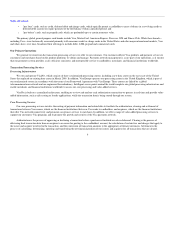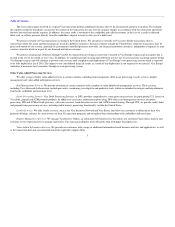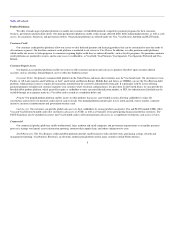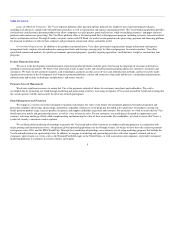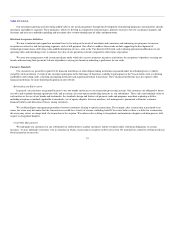Visa 2009 Annual Report Download - page 16
Download and view the complete annual report
Please find page 16 of the 2009 Visa annual report below. You can navigate through the pages in the report by either clicking on the pages listed below, or by using the keyword search tool below to find specific information within the annual report.
Table of Contents
jurisdictions, interchange rates are subject to government regulation. Although we administer the collection and remittance of interchange reimbursement fees
through the settlement process, we generally do not receive any portion of the interchange reimbursement fees. Interchange reimbursement fees are often the
largest component of the costs that acquirers charge merchants in connection with the acceptance of payment cards. We believe that interchange
reimbursement fees are an important driver of system volume.
As the volume of card-based payments has increased in recent years, interchange reimbursement fees, including our default interchange rates, have
become subject to increased regulatory scrutiny worldwide. We believe that regulators are increasingly adopting a similar approach to interchange
reimbursement fees, and, as a result, developments in any one jurisdiction may influence regulatory approaches in other jurisdictions.
Interchange reimbursement fees and related practices have been the topic of recent committee hearings in the U.S. House of Representatives and the
U.S. Senate, as well as conferences held by a number of U.S. Federal Reserve Banks. In 2009, legislation concerning interchange, entitled the "Credit Card
Fair Fee Act of 2009," was introduced in the U.S. House of Representatives and referred to the House Judiciary Committee, but no further action has been
taken on the measure. In 2008, a similar bill was reported out of the Judiciary Committee on a divided vote of 19-16, but was not taken up by the full U.S.
House of Representatives. In its current iteration, the legislation seeks to regulate interchange by allowing merchants to collectively seek to lower their
interchange costs by exempting such action from the U.S. antitrust laws. The Credit Card Fair Fee Act of 2009 also requires the U.S. Department of Justice, or
DOJ, to oversee collective merchant negotiations with the Company and its customer financial institutions (and separately with MasterCard and its customer
financial institutions) and report results of those negotiations back to the U.S. Congress. A companion bill has been introduced in the U.S. Senate Judiciary
Committee, but there have not been any hearings on, or further movement of, the legislation.
Additional interchange legislation also has been introduced in the U.S. House of Representatives that would prohibit specified electronic payment
system network practices, including the imposition of additional charges on merchants and consumers for premium payment cards. The bill also directs the
Federal Trade Commission, or FTC, to prescribe regulations to ensure that the rules, terms, and conditions to which a merchant or consumer is subject under
an agreement with an electronic payment system network are neither unfair nor deceptive to consumers and merchants, nor anticompetitive. There has,
however, been no further action on or developments with respect to this legislation.
The Credit Card Accountability, Responsibility, and Disclosure Act of 2009, or the Credit CARD Act, which was passed by both houses of the U.S.
Congress and became law, commissioned a study by the Comptroller General of the United States of the extent to which interchange reimbursement fees are
disclosed, the effect of fees and disclosure on merchants, the impact on consumer prices of interchange regulation in other jurisdictions, the relationship
between interchange reimbursement fees and bank and merchant costs, and the role of interchange in promoting competition in the provision of payment
cards. The resulting report was issued by the U.S. Government Accountability Office in November 2009. Individual state legislatures in the United States are
also reviewing interchange reimbursement fees, and legislators in a number of states have proposed bills that purport to limit interchange reimbursement fees
or merchant discount rates or to prohibit their application to portions of a transaction.
In addition, the Merchants Payments Coalition, a coalition of trade associations representing businesses that accept credit and debit cards, is mounting a
challenge to interchange reimbursement fees in the United States by seeking additional legislative and regulatory intervention. Interchange reimbursement
fees and related practices also have been or are being reviewed by regulatory authorities and/or central banks in a number of other jurisdictions, including the
European Union,
15



